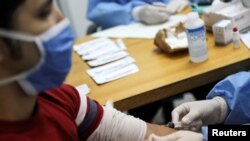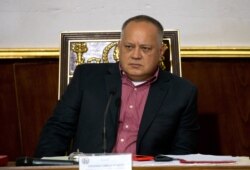A powerful Venezuelan official is seeking an investigation of the nation's academy of scientists for publishing research that questioned official figures on coronavirus cases and estimated the pandemic may hit the country hard in the coming months.
Venezuela's Academy of Physical, Mathematical and Natural Sciences in a report published this month said official figures of 440 cases and 10 deaths appeared inconsistent with the COVID-19 epidemic, and that the country could register 4,000 cases daily as early as June.
"The numbers that they use are not supported," Socialist Party Vice President Diosdado Cabello said, referring to the report on his weekly show Wednesday night. "It should be investigated."
On Thursday the academy released a statement in response, reiterating the report's two main conclusions: that testing should be increased and that it was unlikely the pandemic's curve would be flattened at this time, underscoring the country should prepare for a forthcoming peak in the pandemic.
"It worries us as scientists, that we are harassed and marked for a technical report intended to improve management of the pandemic," the statement added. The report used a mathematical model that the London School of Hygiene and Tropical Medicine had developed earlier this year.
Venezuela's information ministry did not respond to a request for comment.
Venezuela's testing program has largely relied on rapid blood tests donated by the Chinese government, while its polymerase chain reaction (PCR) testing capacity remains low. The PCR molecular tests are recommended by the World Health Organization and are considered more reliable than the rapid blood tests.
Only positive PCR tests certified by a single, overstretched Caracas lab — the National Institute of Hygiene — that can test a maximum of 100 samples per day, are included in the government's official coronavirus case count. This has created a backlog that has kept the country's confirmed case count artificially low, according to four of the people with knowledge of the facility.
The government has previously sought to arrest critics of the nation's rickety health care system, where some hospitals lack basics like soap and running water. The critics have said the government is ill-prepared to confront the deadly pandemic.
"Providing scientific facts in an unbiased way for the well-being of our people who are suffering the worst crisis in our history, is a heroic act that deserves to be recognized by all Venezuelans," the opposition-controlled National Assembly said in a statement denouncing the threats against the academy.

